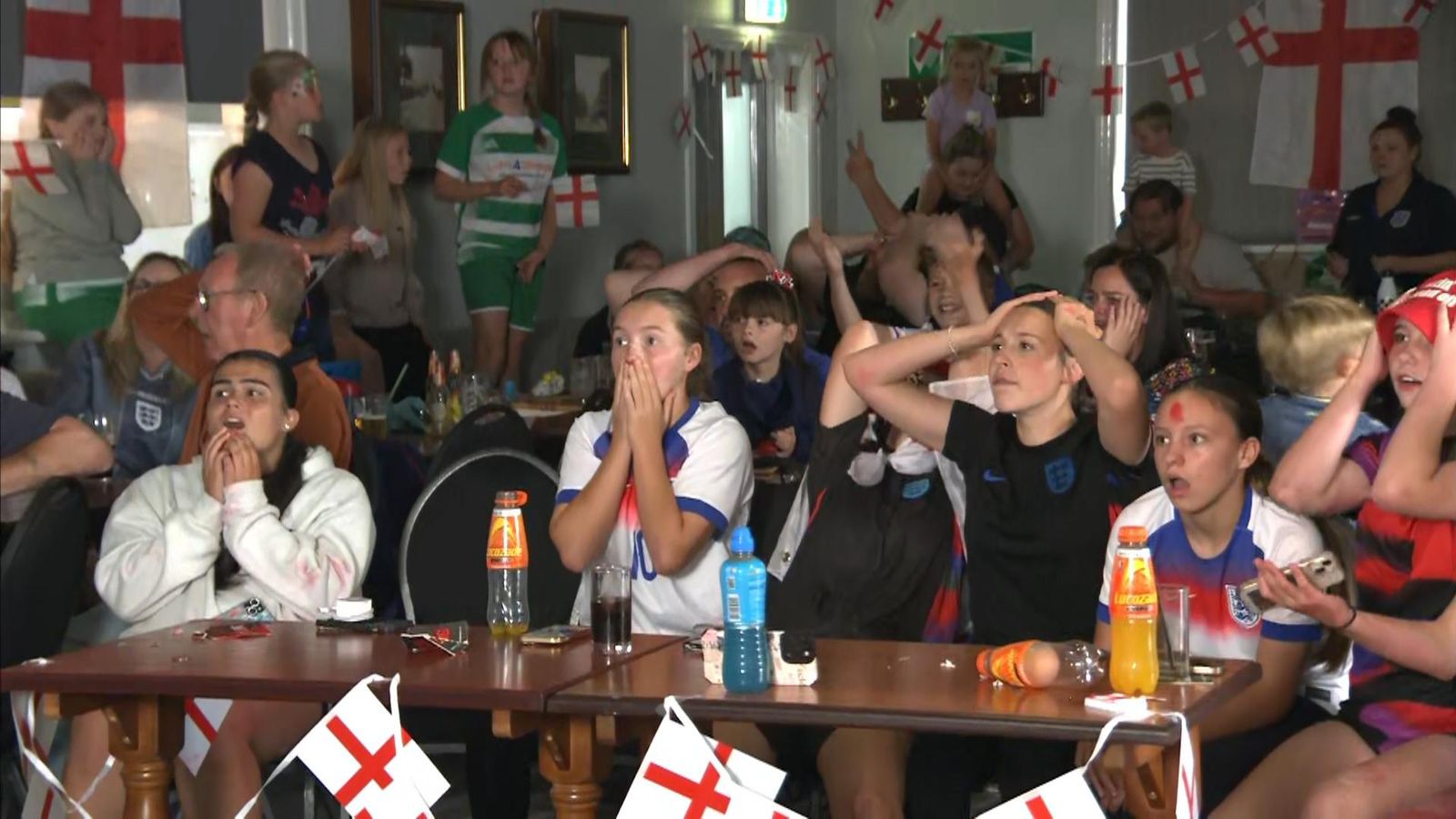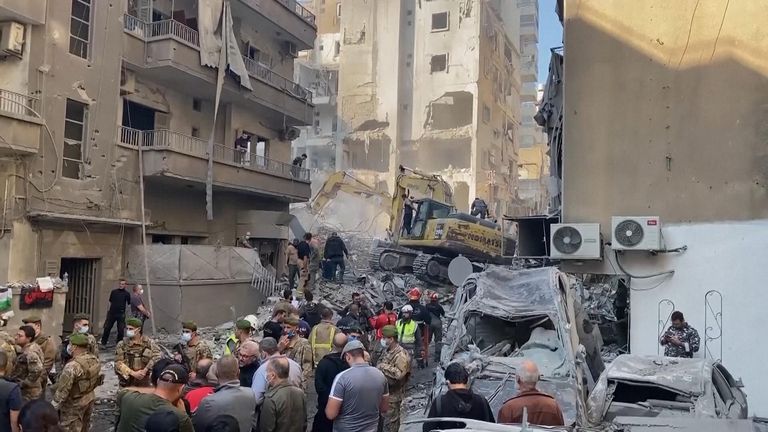Can you ban a protest – and will pro-Palestinian march go ahead on Armistice Day?
Policing experts have told Sky News the situation is a "no win" for police, with groups likely to turn out in central London even if an event was restricted or banned.

Pressure has been mounting on police to ban a pro-Palestinian demonstration in London from happening on Armistice Day this Saturday.
The Public Order Act allows the head of the Metropolitan Police to ask the home secretary's permission to ban or impose conditions on protests.
But Met Police commissioner Sir Mark Rowley has said this week's march will go ahead, while assuring people "we're going to keep this away from the remembrance and armistice events".
Policing experts have told Sky News the situation is a "no win" for police, with groups likely to turn out even with a ban.
Meanwhile, Prime Minister Rishi Sunak has argued there is a "clear and present risk" of the Cenotaph and other war memorials being vandalised.
Here we look at what is happening in London and what powers the police and the government have.

What is planned for Remembrance weekend?
Saturday
At 11am on Armistice Day - Saturday 11 November - the nation will observe a two-minute silence to remember those who have died in war.
Members of the Western Front Association will be taking part in a parade from 10.25am, with a service of commemoration at the Cenotaph from 11am to 11.25am, which will include wreath laying and a bugler playing The Last Post.
A ticketed festival of remembrance event organised by the Royal British Legion is also taking place at the Royal Albert Hall in London between 2pm and 7pm.
Protest groups, including the Palestine Solidarity Campaign and the Stop The War Coalition, have been holding weekly demonstrations in central London to demand a ceasefire in the Israel-Hamas conflict.
This Saturday, the protest groups have said they have "no intention of marching on or near Whitehall, in order not to disrupt events at the Cenotaph".
Their protest route is from Hyde Park to the US Embassy and will begin at 12pm.

Sunday
The National Service of Remembrance starts at 10.30am on Whitehall and will be attended by the King, prime minister, military personnel and war veterans.
A procession towards the Cenotaph will take place at 10.50am, followed by another two-minute silence at 11am, with the service ending at 11.25am.
There are no protests planned for Sunday.
What have politicians said?
Rishi Sunak wrote to Metropolitan Police commissioner Sir Mark Rowley last week saying he was "deeply concerned" about protests planned for Armistice Day.
He claims organising marches for 11 November is "provocative and disrespectful" and reminded Sir Mark of the powers police have to "ensure protests do not disrupt Remembrance activity", namely the Public Order Act 1986 and Public Order Act 2023, as well as the Highways Act 1980.
Ms Braverman told Sky News anyone trying to vandalise the Cenotaph "must be put into a jail cell faster than their feet can touch the ground".
The home secretary has also condemned disorder at the weekly pro-Palestinian marches held so far as "utterly despicable".
Sir Mark Rowley wrote back to Mr Sunak to say "officers recognise the profound importance of remembrance events and are committed to playing their role, as they do each year, to ensure they take place without disruption and that our communities can pay their respects".
On Wednesday he added: "If over the next few days the intelligence evolves further and we get to such a high threshold - it's only been done once in a decade - where we need to say to the home secretary we need to ban the march element, then of course we will do. But that's a last resort we haven't reached."
What does the law say?
Under section 13 of the Public Order Act 1986, the Met commissioner can ask the home secretary to stop a protest from taking place.
But he can only do so if he has reason to believe it could cause "serious public disorder, serious criminal damage or serious disruption to the life of the community".
It has only been used once in recent decades - to prevent a march by the English Defence League in Tower Hamlets, east London, in 2011.
Section 12 of the same act allows conditions to be imposed on public processions, which could include restricting the protest route or stopping it from taking place at a certain location, such as Whitehall.
Section 14 allows conditions to be placed on "assemblies" and "gatherings", which are static - as opposed to marches, the threshold for which are the same as sections 12 and 13.
A new law, the Police Crime and Sentencing Act 2022, increased prison sentences for damaging memorials or statues to 10 years or a maximum £5,000 fine.
The Public Order Act 2023 also made "locking on", "tunnelling" or "going prepared" to do either a specific offence - to counter techniques used by groups such as Just Stop Oil and Extinction Rebellion.
Ban 'could cause more trouble'
If a section 13 ban is imposed, there is no guarantee protesters will adhere to it, policing experts have warned.
Chris Hobbs is a former Met Police and Border Force officer who has been attending the Saturday marches as an observer.
He told Sky News: "On balance I think police would rather it went ahead than thousands of people turning up illegally.
"My view is that to call it off could create more trouble - because do police then move in and arrest people to break it up?
"There have been hundreds and hundreds of children on these marches - including babies and toddlers. So if police do move in you have the possibility of children getting injured."

Former Met officer and policing commentator Graham Wettone says that based on Sir Mark Rowley's comments, the intelligence for potential "serious disorder" has not been met, but he "did not rule out the situation changing before Saturday".
Another former officer, Roger Gomm, who previously led the Met's public order command, said the Public Order Act's criteria for possible "serious disruption to the life of the community" is relatively easily met.
However, he said enforcing it is a different issue - making section 12 conditions an "easier" option.
"If you have a group of people marching from point A to point B in central London it's going to cause disruption," he said.
"But it's a very difficult decision because whichever option the police choose, it has the potential to cause tension with other groups and the officers are in the middle."
Mr Wettone said that if a ban is imposed, "organising groups will still have people attend a 'gathering".
He added that the idea of ban "may well increase numbers" who want to attend a static gathering.
Mr Hobbs said his main concerns are the periods between the minute's silence and the start of the march - and after the protest finishes.
He said: "There's a big gap between 11am and 12pm, so you could get pro-Palestinian protesters close to Whitehall before they move on to Hyde Park.
"But the problems seem to come afterwards. Most people go home, but some - youths, far-right groups and others, possibly thousands of them - will make their way back to Westminster anticipating a ruck with police."
The Met says there will be more than 1,600 officers on duty on Saturday - with many drafted in to help from other forces.
So far there have been more than 100 people arrested during demonstrations. Of those, 26 have been charged under the Public Order and Anti-social Behaviour, Crime and Policing Act.







